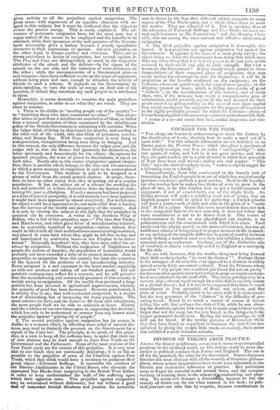COOKERY FOR THE POOR.
" THE clergy are humanely endeavouring to meet the distress by the distribution of books showing how to make a meal out of a mere trifle." For this valuable information we are indebted to an Exeter paper, the Western Tier's; which also gives a specimen of these timely receipts, one how to make " onion-porridge " : take two quarts of water, and boll in it ten good onioas; and when they are quite tender, stir in a pint of water in which four spoonfuls of flour have been well mixed; adding salt and pepper. "This dish," says the clerical cookery-book, " makes a capital supper for a labouring man or a family."
Unquestionably, those who condescend to the homely task of instructing the English people in an art of which they are profoundly ignorant—cookery—perform a good service. Next to the benefac- tor who teaches how to makes two blades of corn to grow in the place of one, is he who teaches how to get a double measure of enjoyment, if not of nourishment, out of the single blade. An Italian peasant will make a relishing meal out of scraps that an English pauper would be pitied for gathering ; a French grisette will dress a pennyworth of odds and ends in the guise of a "made dish" fit for a prince. Grant that more nourishment does not lurk in the compound than in the raw material, it does not follow that more nourishment is not to be drawn from it. One source of wholesomeness in food, as any physiologist can explain, is its palateableness and the contentment with which it is eaten. Food swallowed like physic, merely as the means of existence, has but an- indifferent chance of being turned to proper account in the stomach; to say nothing of the tangible difference in point of comfort between merely bolting a tasteless meal as a duty and relishing a discreetly seasoned mess as a pleasure. Cookery, one of the distinctive arts of mankind, is almost voluntarily ceded in England as a monopoly for the rich.
We are told, however, that the worthy clergymen bring forward their little cookery-books "to meet the distress " ! Perhaps theirs is the strangest of all remedies ever opposed to a distress so widely spread as to be fairly accounted national. Even the Princess, whose question "why people who could not get bread did not eat pastry" has been so often quoted, knew bet t er than to propose a mere cookery- book as a substitute for the staff of life. The onion-porridge may be a savoury slop—almost sapid-enough for a side-dish in an early course at a clerical dinner; but it is not to be supposed that there is much nourishment in four spoonfuls of flour, ten onions, and five pints of water. Probably, bread to be eaten with it is understood: but the very gravamen of the "distress" is the difficulty of pro- curing bread. Bread is so much a matter of course at decent tables, like salt, that perhaps the clerical Ude, while he was show- ing the destitute epicure how easy it is to make soup without turtle, forgot that not the soup, but the very bread, is the thing which the pauper gourmand desiderates. Having the onion-porridge, he will still ask for bread. If the worthy parsons of Devonshire think that they have found an expedient to frustrate the Anti-Corn-law agitation by giving the people little tracts on cookery, there never was exhibited a more innocent mistake.


























 Previous page
Previous page